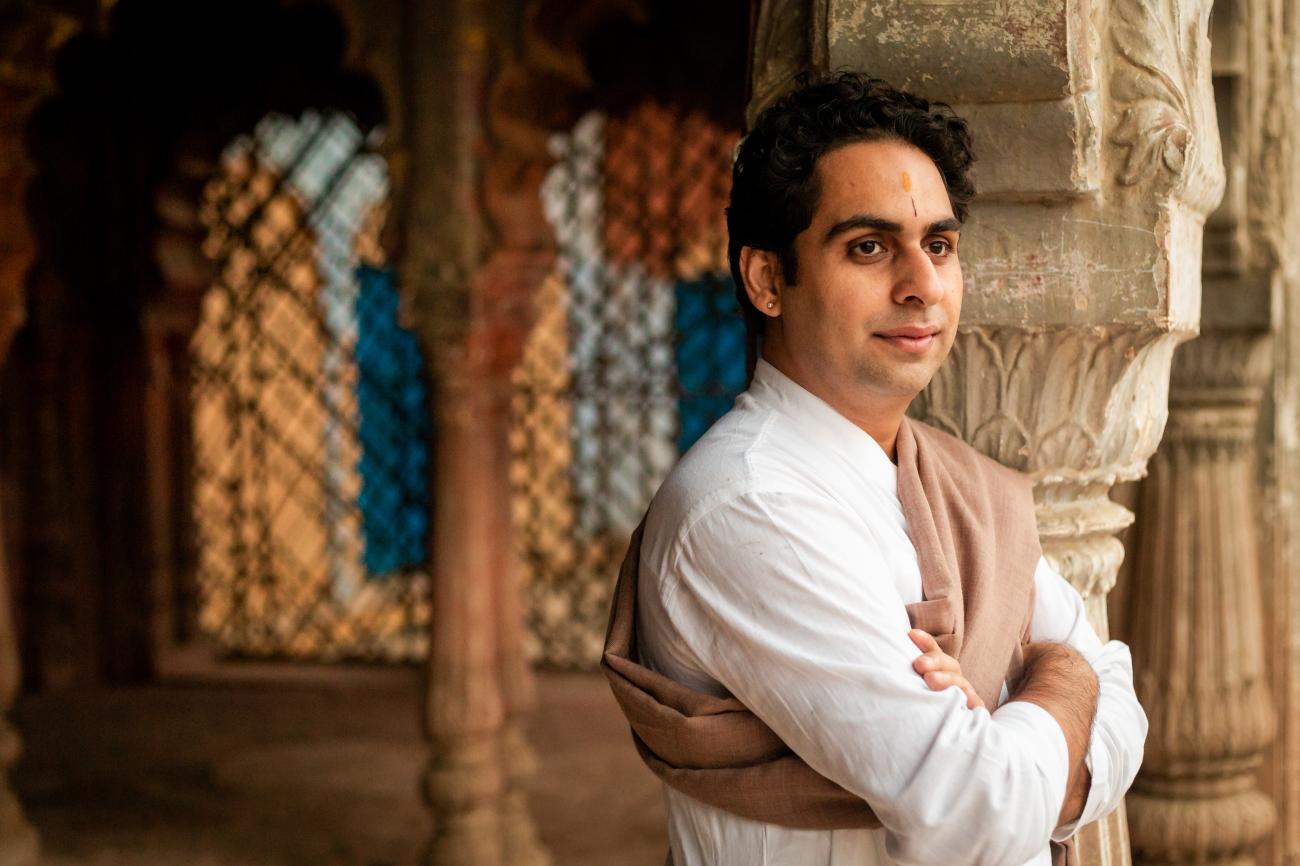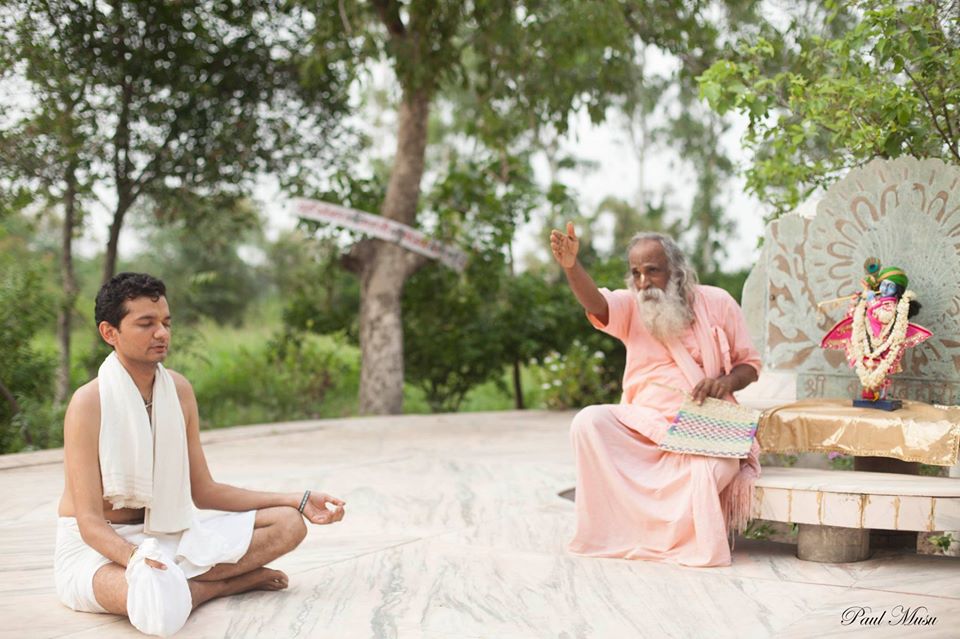How to Live in Vrindavan

Many devotees long to live in Vrindavan, but without the association of the rasiks – saints who have a relationship of loving service for Radha and Krishn, and for whom Radha and Krishn are everything – we cannot understand what Vrindavan really is. Without their grace, we cannot know the significance of Braj dust, which is eternally decorated with Radha and Krishn’s footprints, or the nature of pure love for them, which we are trying to attain.
Reading books about devotion is good, and also recommended, but it is even more important to spend time with people who truly understand their teachings and live their lives by them. Without such association, the devotional practice of living in Vrindavan is very difficult. We may think we can attain our spiritual goals by sitting alone and immersing ourselves in chanting and meditation, but this is not practical for many people. In the Shrimad Bhagwatam, Bharat Muni also worshipped in isolation, and for a long time, he progressed very well. He even reached a high level of devotion called bhav bhakti.
Bharat Muni’s devotional ecstasy was so deep that he was able to serve Krishn all the time. But one day, he found a baby deer that had lost its mother. As he started taking care of the deer, his mind was diverted, and the deer slowly replaced Krishn in his heart.
Why did this happen when Bharat Muni was such an accomplished devotee? It happened because he did not have the association of rasik saints, nor did he have a guru in his life. If he did, his guru could have told him, “Bharat, your care for the baby deer is commendable, but don’t let this situation distract you from your goal of one-pointed and loving service for Krishn.” Without association, there was no one to correct him, and he had to take two more births before attaining his Beloved.
We are not nearly as advanced as Bharat was, so to think we can live without association is a great mistake. Further, the Shodash Granth says that performing devotion in isolation can lead to pride. If we forget that the ability to perform worship is itself a gift of divine grace, we may start to feel self-satisfied, thinking, I serve so many saints, I chant so many Holy Names, and so forth. In contrast, good association keeps us humble and focussed. The Chaitanya Charitamrit (2.22.54) says that even a moment of association with rasik saints can grant all perfection: in other words, the ultimate goal of prem (sacred love) for Radha and Krishn. If we keep good association, one day, Radha and Krishn will give us eternal association by allowing us to serve them in eternal Vrindavan, under the guidance of the greatest of all devotees, the gopis.
Muchos devotos anhelan vivir en Vrindavan, pero sin la asociación de los rasiks —santos que tienen una relación de servicio amoroso con Radha y Krishna, y para quienes Radha y Krishna lo son todo— no podemos comprender lo que realmente es Vrindavan. Sin su gracia, no podemos conocer el significado del polvo de Braj, eternamente adornado con las huellas de Radha y Krishna, ni la naturaleza del amor puro por Ellos, ese amor que estamos intentando alcanzar.
Leer libros sobre la devoción es bueno, e incluso recomendable, pero es aún más importante pasar tiempo con personas que realmente comprenden esas enseñanzas y viven de acuerdo con ellas. Sin esa asociación, la práctica devocional de vivir en Vrindavan se vuelve muy difícil. Podemos pensar que podemos alcanzar nuestras metas espirituales sentándonos a solas e inmersos en el canto y la meditación, pero esto no es práctico para muchas personas. En el Shrimad Bhagavatam, Bharat Muni también adoraba en aislamiento, y durante mucho tiempo progresó muy bien. Incluso alcanzó un alto nivel de devoción llamado bhav bhakti.
El éxtasis devocional de Bharat Muni era tan profundo que podía servir a Krishna todo el tiempo. Pero un día encontró a una cría de ciervo que había perdido a su madre. Al comenzar a cuidar del ciervo, su mente se distrajo, y poco a poco, el ciervo fue ocupando el lugar de Krishna en su corazón.
¿Por qué le ocurrió esto a Bharat Muni, siendo un devoto tan avanzado? Ocurrió porque no tenía la asociación de santos rasik, ni tampoco tenía un guru en su vida. Si lo hubiera tenido, su guru podría haberle dicho, “Bharat, tu cuidado hacia la cría de ciervo es admirable, pero no dejes que esta situación te distraiga de tu meta: el servicio amoroso y enfocado a Krishna.” Sin esa asociación, no hubo nadie que lo corrigiera, y tuvo que tomar dos nacimientos más antes de alcanzar a su Amado.
Nosotros no estamos ni cerca del nivel de avance espiritual que tenía Bharat, así que pensar que podemos vivir sin asociación es un gran error. Además, el Shodash Granth dice que practicar la devoción en aislamiento puede llevar al orgullo. Si olvidamos que la capacidad de adorar es en sí misma un regalo de la gracia divina, podemos comenzar a sentirnos autosuficientes, pensando: “Sirvo a tantos santos, canto tantos Nombres Sagrados,” y cosas por el estilo. En cambio, la buena asociación nos mantiene humildes y enfocados. El Chaitanya Charitamrita (2.22.54) dice que incluso un solo momento de asociación con santos rasik puede otorgar toda la perfección; en otras palabras, el objetivo supremo del prem (amor sagrado) por Radha y Krishna. Si mantenemos buena asociación, un día Radha y Krishna nos darán Su asociación eterna, permitiéndonos servirlos en el Vrindavan eterno, bajo la guía de las más grandes devotas: las gopis.
